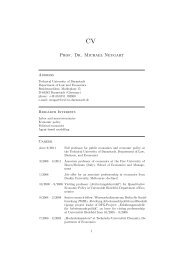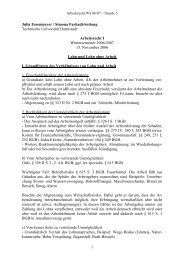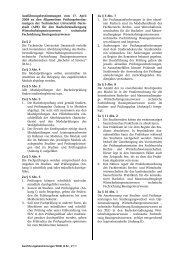Titel für - Fachbereich Rechts- und Wirtschaftswissenschaften
Titel für - Fachbereich Rechts- und Wirtschaftswissenschaften
Titel für - Fachbereich Rechts- und Wirtschaftswissenschaften
Erfolgreiche ePaper selbst erstellen
Machen Sie aus Ihren PDF Publikationen ein blätterbares Flipbook mit unserer einzigartigen Google optimierten e-Paper Software.
Corporate Finance II: Nachdem in der Veranstaltung "Corporate Finance I" die Eigenkapitalfinanzierung der<br />
Unternehmen betrachtet wurde, beschäftigt sich die Vorlesung "Corporate Finance II" mit dem Spektrum<br />
der Fremdkapitalfinanzierung. Zunächst wird auf die Möglichkeiten der Bankfinanzierung eingegangen. Es<br />
werden theoretische Modelle zur Existenzerklärungen von Banken, der optimalen Ausgestaltung von<br />
Kreditverträgen, Kreditrationierung <strong>und</strong> Relationship Banking vorgestellt. Im zweiten Teil werden die<br />
Instrumente zur Fremdkapitalfinanzierung am Kapitalmarkt vorgestellt. Dabei steht die Funktionsweise <strong>und</strong><br />
Bewertung verschiedener Unternehmensanleihen im Vordergr<strong>und</strong>. Schließlich werden unterschiedliche<br />
Kreditderivate <strong>und</strong> deren Nutzen auf Unternehmensseite analysiert.<br />
Corporate Finance III: Die Vorlesung gibt einen breiten Überblick über zentrale Themen der modernen<br />
Corporate Finance (wie Fusionen <strong>und</strong> Übernahmen, die finanzielle Notlage, Leitungs-Anreize,<br />
Ausschüttungspolitik, Corporate Governance <strong>und</strong> empirische Methoden). Der Kurs wird Studierenden in<br />
theoretische Konzepte <strong>und</strong> empirische Forschung einführen <strong>und</strong> auf die zentralen Fragen der<br />
Unternehmensfinanzierung eingehen. Am Ende des Kurses sollen die Studierenden über ein allgemeines<br />
Verständnis der wichtigsten Themen in der theoretischen <strong>und</strong> empirischen Corporate Finance <strong>und</strong> die<br />
Methoden verfügen. Die Vorlesung wird auf Deutsch gehalten <strong>und</strong> Studierende sollen Aufsätze bzw.<br />
Buchkapitel entsprechend vorbereiten. Die schriftliche Prüfung wird in Deutsch abgehalten.<br />
Projektmanagement I: Gr<strong>und</strong>lagen Konfigurationsmanagement, Abgrenzung Projekt, Programm <strong>und</strong> Portfolio,<br />
Kommunikation <strong>und</strong> Stakeholder Management, Qualitätsmanagement, Scope <strong>und</strong> Change Management,<br />
Personalmanagement<br />
Projektmanagement II: Gr<strong>und</strong>lagen zur Planung <strong>und</strong> Entscheidung von Projekten, Projektziele, Generierung<br />
von Projektalternativen, Abgrenzung <strong>und</strong> Verknüpfung von Projekten, Prognose als Basis der Entscheidung,<br />
Projektauswahl bei singulärer Zielsetzung, Projektauswahl unter Unsicherheit, Projektauswahl bei multipler<br />
Zielsetzung, Einführung in die Projektportfolioplanung<br />
Projektfinanzierung: Modelle <strong>und</strong> Realisierungsmöglichkeiten öffentlich-privater Partnerschaften, Investition<br />
<strong>und</strong> Finanzierung, Projektfinanzierungen, Verkehrsinfrastruktur<br />
Contents:<br />
Case Study "Business Valuation": In the course "Fallstudie Unternehmensbewertung" we focus on company<br />
analysis and company valuation based on actual case studies. Different valuation techniques will be applied<br />
and discussed. Students are expected to participate actively and prepare company analyses on their own.<br />
Corporate Finance I: The course discusses major ways companies employ to finance their operations via capital<br />
markets. Equity financing is the focus of this course. Students learn about the mechanism and reasoning<br />
behind Initial Public Offerings (IPO). In particular, the course examines conceptual and application<br />
perspectives related to initial <strong>und</strong>erpricing of IPOs, the valuation of IPOs, and different allocation<br />
procedures of shares. Theoretical discussions are followed by empirical findings to each topic. Then, the<br />
rational of seasoned equity offerings (SEO) is analyzed. Topics include the legal framework in different<br />
countries, cycles, <strong>und</strong>epricing, and performance of SEOs. The rational of corporate cross-listing decisions is<br />
examined as well. The second part of the course focuses on debt financing. Students are introduced to bond<br />
markets. The emphasis is on bond pricing as well as reasons, characteristics and types of corporate bonds.<br />
Corporate Finance II: Whereas "Corporate Finance I" focuses primarily on equity financing, "Corporate Finance<br />
II" aims for ways a company can finance itself via debt. We first introduce bank based lending. Theoretical<br />
models on the existence of banks, optimal credit contracts, credit rationing, and relationship banking are<br />
covered. Second, we introduce market based lending. We discuss the characteristica of different kind of<br />
bonds and the f<strong>und</strong>amental principals in bond valuation. Finally, debt contracts and derivaties are covered.<br />
Corporate Finance III: This lecture gives a broad overview of central topics in modern corporate finance (such<br />
as mergers and acquisitions, financial distress, managerial incentives, payout policy, corporate governance<br />
and empirical methods). The course will introduce students to theoretical concepts and empirical research<br />
on central topics of corporate finance. By the end of the course, students will have a general <strong>und</strong>erstanding<br />
of the main issues in theoretical and empirical corporate finance and the methodologies used to obtain<br />
these results. The lectures will be held in German and students will have to read paper or book chapter for<br />
each lecture. The final written test will be in German.<br />
Project management I: Basics of planning and decision making for projects, Project goals, Generation of project<br />
alternatives, Separation Basics in Configuration Management, Project definition, Program – Portfolio,<br />
Stakeholder Management and Communication, Quality Management, Scope and Change Management,<br />
Human Resources Management for Projects / Project Managers<br />
Project Management II: Basics of planning and decision making for projects, Project goals, Generation of project<br />
alternatives, Separation and linking of projects, Prognosis as a basis of decision making, Project selection<br />
in the case of singular goals, Project selection in the case of uncertainty, Project selection in the case of<br />
<strong>Rechts</strong>- <strong>und</strong> <strong>Wirtschaftswissenschaften</strong> | Wirtschaftsinformatik | M.Sc. | Modulhandbuch 94













